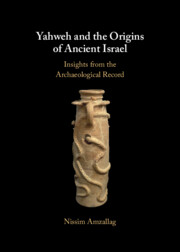Book contents
- Yahweh and the Origins of Ancient Israel
- Yahweh and the Origins of Ancient Israel
- Copyright page
- Contents
- Figures
- Tables
- Preface
- Abbreviations
- Introduction: Idols of Knowledge
- Part I The Movement of Emancipation in the Southern Levant
- Part II The Primeval Identity of YHWH
- Chapter Five The Metallurgical Background of Ancient Yahwism
- Chapter Six YHWH and El
- Part III The Conception of Israel
- Conclusion
- Bibliography
- Subject Index
- Scripture Index
- ANE Sources and Classics Index
Chapter Six - YHWH and El
from Part II - The Primeval Identity of YHWH
Published online by Cambridge University Press: 18 May 2023
- Yahweh and the Origins of Ancient Israel
- Yahweh and the Origins of Ancient Israel
- Copyright page
- Contents
- Figures
- Tables
- Preface
- Abbreviations
- Introduction: Idols of Knowledge
- Part I The Movement of Emancipation in the Southern Levant
- Part II The Primeval Identity of YHWH
- Chapter Five The Metallurgical Background of Ancient Yahwism
- Chapter Six YHWH and El
- Part III The Conception of Israel
- Conclusion
- Bibliography
- Subject Index
- Scripture Index
- ANE Sources and Classics Index
Summary
The Bible equates YHWH and El, and the metallurgical attributes of the Levantine El confirm this identification. These elements suggest that YHWH was formerly the secret name of the god attributed to his esoteric cult, whereas El/Elohim, a public designation, articulated his ascendancy over the official religion. In this religious system, the goddess Asherah enjoyed the status of mediator of the super-god rather than his wife. The ambivalence of the figure of El in Ugarit reflects the erosion of his super-god dimension and his reduction to the rank of father/procreator of gods involved in the promotion of Amorite beliefs. The rehabilitation of the former status of El in the Early Iron Age corroborates the renewed prestige of metallurgy in the Southern Levant. It also resolves the conundrum between the biblical claim of YHWH honored among nations and his anonymity outside Israel.
Keywords
- Type
- Chapter
- Information
- Yahweh and the Origins of Ancient IsraelInsights from the Archaeological Record, pp. 178 - 196Publisher: Cambridge University PressPrint publication year: 2023

